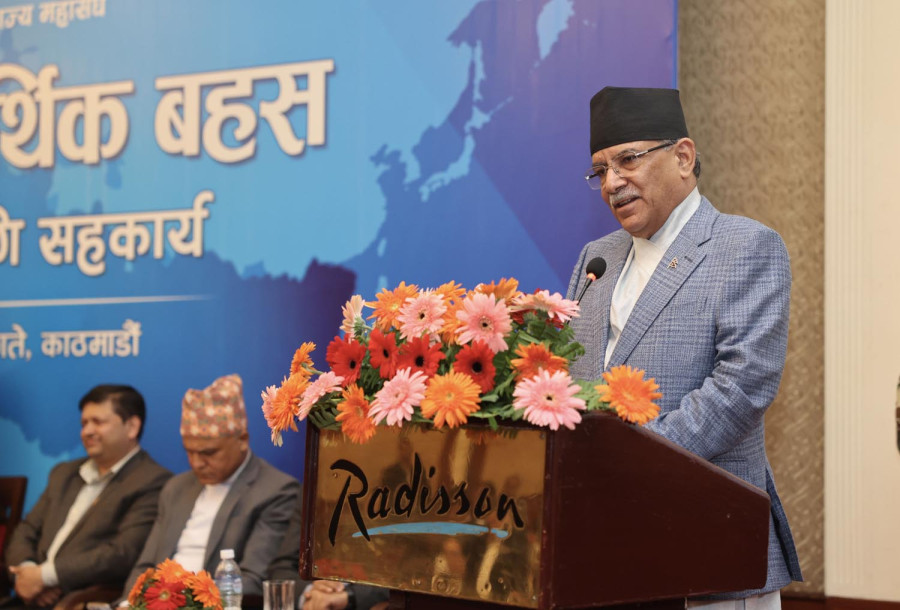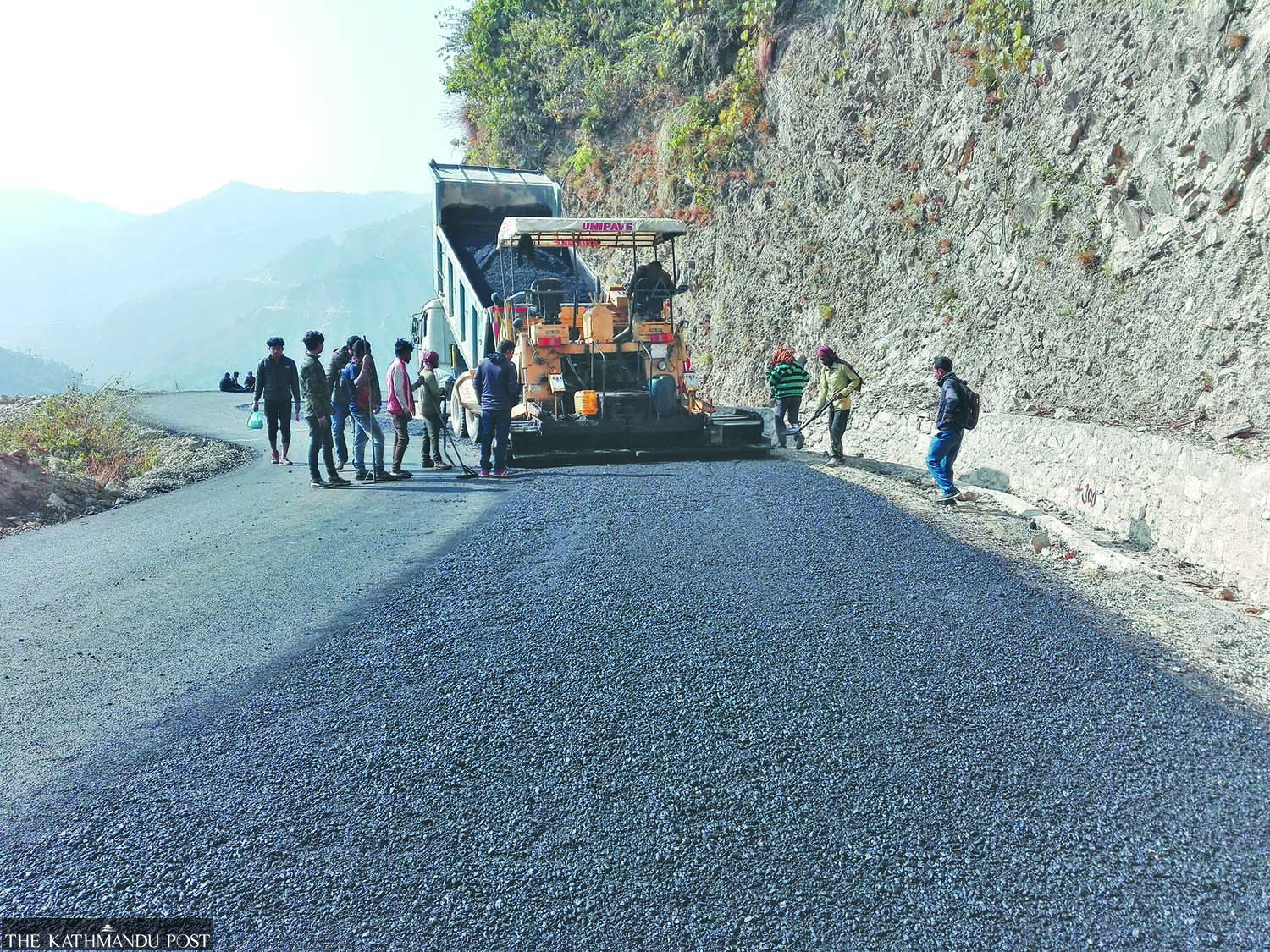Money
Dahal vows sweeping economic reforms
Experts blame low demand, falling public confidence and high interest rates for the slump.
Subin Adhikari
Prime Minister Pushpa Kamal Dahal on Thursday assured the private sector that the government would launch sweeping economic reforms to pull the country out of the “crisis” resulting from a drawn out slowdown.
“We have made some attempts to ease the situation. We liberalised stock broker licences, reopened [residential] land plotting and requested non-resident Nepalis to invest in Nepal,” Dahal said, speaking at the National Economic Dialogue organised by the Federation of Nepalese Chambers of Commerce and Industry (FNCCI).
“But that doesn’t seem to have brought major changes in the economy. To bail out Nepal’s economy, we need radical reforms.”
Dahal said he was in consultation with experts, bureaucrats, the central bank and the private sector for suggestions to make bold decisions.
“Due to time limits, we were unable to bring schemes to bail out the economy this year, but we have already started work for appropriate reforms in the next fiscal year,” he said.
The private sector has repeatedly blamed the government for making ad-hoc amendments to the economic policies and spreading confusion.
Dahal admitted his administration had made mistakes, and promised to form a commission to draft a new economic policy based on inputs from multiple stakeholders, including the private sector.
The prime minister currently has half a dozen economists among his advisers.
The International Monetary Fund (IMF) said in a recent report that Nepal’s external position had strengthened, supported by prudent fiscal and monetary policies, buoyant remittances, and post-pandemic rebound in tourism, despite spikes in regional food prices.
However, growth is estimated to have slowed in the past fiscal year, reflecting last year’s import restrictions and regulatory uncertainty in land markets and construction licensing, lower credit flows, and weaker domestic demand in the context of large post-Covid emigration outflows.
The IMF said that the ensuing shortfall in revenue pushed the fiscal year 2022-23 fiscal deficit upward.
In the current fiscal year 2023-24, beginning mid-July 2023, growth is projected to recover to below the potential 3.5 percent due to weak domestic demand, the IMF said.
Necessary balance sheet repairs after the credit boom and the sluggishness in the real estate market have been limiting credit growth in spite of monetary relaxation, the report further said.
The government has aimed for 6 percent growth in the current fiscal year after suffering one of the lowest growth rates—1.9 percent—in the last fiscal year.
On September 20, the Asian Development Bank projected Nepal's economy to expand by 4.3 percent in the current fiscal year ending mid-July 2024, down from the earlier forecast of 5 percent.
The World Bank also said Nepal’s economy would grow by 3.9 percent in the current fiscal year.
Economists blame low consumption, dwindling public confidence and high interest rates for the current economic slump.
Nepal's economy is foundering under the weight of heavy debts, low revenue collection, low capital expenditure, mass movement of young people abroad in search of jobs, low foreign direct investment, slowed credit growth, lost tourism revenue and other effects of the pandemic, as well as a sharp rise in the cost of household commodities.
The private sector has often accused the government of disregarding its suggestions.
“The private sector gave several suggestions to the government and the central bank to bring the economy back on track. Most of them were overlooked,” said FNCCI president Chandra Prasad Dhakal.
“The government thinks that the private sector is a bunch of profit mongers. This has lowered our morale.”
In the recent past, the government has been making many ad-hoc policy decisions, alarming potential domestic and international investors.
For example, according to market observers, the government's ad-hoc import restriction policy in April 2022 encouraged smuggling and discouraged investment. The result was that the government suffered a massive fiscal deficit and the country’s economy fell into total disarray.
Economists say that inflation is growing fast but the government has no clue about how to tame it.
According to the central bank, the consumer inflation rate hovered at 7.52 percent in the first month of the current fiscal year. Imports decreased by 1.6 percent and exports by 8.7 percent in the review period.

Rejecting the prime minister’s claim that the country was in an “economic crisis”, Minister of Industry, Commerce and Supplies Ramesh Rijal said, “The profit of the private sector has not increased. We cannot say that the country is in an economic crisis based on this fact.”
Rijal accused the private sector of spreading panic among the public by exaggerating the situation even when the government was doing its best to bring about economic progress.
Economist Achyut Wagle said national consensus was needed to determine whether the economy is in trouble. “If the country is in crisis, there is a need to assess which sectors are in trouble,” he said.
“The government’s capital expenditure in the first two months of the current fiscal year stood at 4.33 percent and it collected only 14 percent of targeted revenue. Amid this grim outlook, the government is terrorising the private sector by bringing bills such as the one to nationalise the private schools and colleges,” said Wagle.
“The economic outlook is grim. As a result, the amount of loanable funds held by banks have piled up to more than Rs500 billion. This shows the private sector is afraid to borrow and invest.”
He said releasing the payments owed to construction contractors was a good way to kick-start the economic cycle.
The government hasn't paid around Rs60 billion owed to contractors from the last fiscal year. “I don’t understand what’s stopping the government from taking these corrective measures.”
Bam Bahadur Mishra, deputy governor of Nepal Rastra Bank, said the central bank was also willing to cooperate with the private sector in making progressive policies.
“Past decisions like the import ban were made to protect the external sector during the economic turbulence caused by the global economic crisis. We have been successful in stabilising the external sector up to an extent,” said Mishra.
“Our priority now is to control inflation and lower the interest rate,” he said. “The interest rate of 10 to 11 percent per annum is a comfortable rate for a developing country like Nepal. The private sector should not hesitate to borrow at this rate.”




 18.12°C Kathmandu
18.12°C Kathmandu













